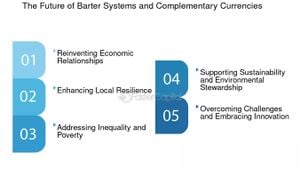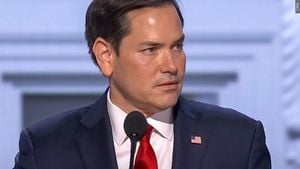President-elect Donald Trump has made headlines once again, this time by naming his criminal defense attorney, Todd Blanche, as the new deputy attorney general. This major appointment reflects Trump’s inclination to rely on his close-knit circle of legal counsel as he aims to fill significant roles within the U.S. Justice Department.
On November 14, 2024, Trump officially announced his decision, stating, "Todd is an excellent attorney who will be a key leader in the Justice Department, fixing what has been a broken system of justice for far too long." This remark captures the essence of Trump's administration agenda heading toward his second term - reshaping the Justice Department to align more closely with his own views.
Blanche has represented Trump through several high-profile criminal cases. Most prominently, he served as Trump's lead attorney during the hush-money trial related to payments made during the 2016 presidential campaign. This case culminated earlier this year with Trump facing convictions on multiple counts. Apart from the hush-money case, Blanche's legal acumen also contributed to Trump's defense against allegations surrounding the handling of classified documents and involvement related to the Capitol riots on January 6, 2021.
Notable moments from the hush-money case included Blanche conducting his cross-examination of Michael Cohen, Trump’s former lawyer. Their exchanges, often fraught with tension, showcased Blanche's combative legal style. During this trial, Blanche faced significant challenges, including clashes with Judge Juan Merchan, who at times questioned his credibility, especially during discussions of the court’s gag order.
Todd Blanche’s career began as a federal prosecutor before he transitioned to private practice about ten years ago. Initially, he was part of the reputable law firm Cadwalader, Wickersham & Taft but stepped down to take Trump on as his client, marking his pivot from establishment law to politically charged defense.
Alongside Blanche’s appointment, Trump also nominated Emil Bove, another attorney from his criminal defense team, for the role of principal associate deputy attorney general. Both men played significant roles defending Trump during pivotal moments of his legal battles, working closely together to navigate the complex legal landscapes they faced.
The decision to select these individuals indicates Trump's strategic focus on surrounding himself with loyal advocates well-versed in the intricacies of his legal issues. It raises questions about the potential for conflicts of interest, particularly as the department undertakes oversight of controversial matters linked to Trump.
John Sauer, who secured Trump’s immunity from prosecution for official actions taken during his presidency, was also appointed as the solicitor general. This position is seen as pivotal for shaping legal arguments important to the Trump administration’s agenda moving forward. Sauer's victory at the Supreme Court could potentially impact the New York business fraud case currently under appeal, as it establishes broad presidential immunity.
With Blanche at the helm of day-to-day operations within the department, he will be responsible for managing the Justice Department's functionalities, as well as advising both Trump and the attorney general on policy priorities. His selection is indicative of Trump’s strategy to install loyalists who not only understand his nuanced legal challenges but are also aligned with his objectives for the Justice Department.
During his first term, Trump made several high-profile appointments and reshuffled his cabinet, often selecting candidates with personal ties and shared ideologies. This pattern appears to continue with his latest choices for key legal positions, aiming to reinforce his agenda and maintain influence over the judicial system.
The Justice Department under Trump is anticipated to be more directly involved with the political machinations of his presidency, particularly concerning oversight of what Trump labels as adversarial investigations against him and his allies. This environment may lead to greater tensions as these developments play out, with critics raising concerns about the potential erosion of independence within the Justice Department.
While Todd Blanche's confirmation as deputy attorney general awaits approval from the Senate, the ramifications of his selection will likely become more pronounced as he and Bove begin their duties. Their roles will likely focus on steering the department's actions, deciphering legal frameworks pertinent to Trump’s interests, and potentially reshaping the narratives surrounding current investigations.
Critics have voiced concerns about how these appointments reflect Trump’s attempts to control legal processes involving himself and his associates. For them, this scenario embodies Trump’s pattern of governance marked by alliance-building among his affiliates. Nevertheless, supporters argue this strategy positions his administration to potentially limit perceived injustices against him.
Trump’s path forward is fraught with both legal and political challenges, but the appointments signal his determination to surround himself with advocates from his inner circle, solidifying his approach to governance as he navigates the likely tumultuous waters of a second term. Whatever his official term will entail, it promises to be one filled with legal battles and high-stakes political maneuvering, with Todd Blanche steering one of the principal ships on this turbulent sea.



